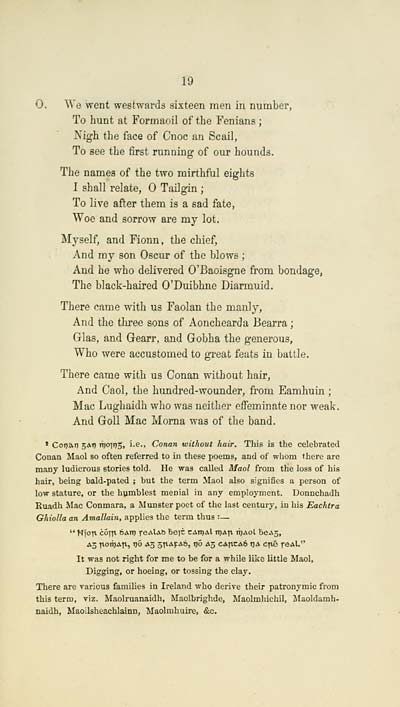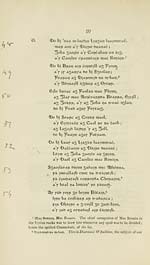Download files
Complete book:
Individual page:
Thumbnail gallery: Grid view | List view

19
0, We went westwards sixteen men in number,
To hunt at Formaoil of the Fenians ;
Nigh the face of Cnoc an Scail,
To see the first running of our hounds.
The names of the two mirthful eights
I shall relate, Tailgin ;
To live after them is a sad fate,
Woe and sorrow are my lot.
Myself, and Fionn, the chief.
And my son Oscur of the blows ;
And he who delivered O'Baoisgne from bondage,
The black-haired O'Duibhne Diarmuid.
There came with us Faolan the manly.
And the tlu-ee sons of Aonchearda Bearra ;
Glas, and Gearr, and Gobha the generous,
Who were accustomed to great feats in battle.
There came with us Conan without hair,
And Caol, the hundred-wounder, from Eamhuin ;
Mac Lughaidh who was neither effeminate nor weak.
And Goll Mac Moma was of the band.
* Coi55xn 5At) njoi»)5, i.e., Conan without hair. This is the celebrated
Conan Maol so often referred to in these poems, and of whom there are
many ludicrous stories told. He was called Maol from the loss of his
liair, being bald-pated ; but the term Maol also signifies a person of
low stature, or the humblest menial in any employment. Donnchadh
Ruadh Mac Conmara, a Munster poet of the last century, in his Eachtra
Ghiolla an Amallain, applies the term thus :—
"t^ioTi co]V. óAii) reAUs beic CAtijAl itjAtt rijAol beA5,
A5 notbA^, VÓ A3 StlAFAO, t)Ó A5 CAttCAÓ 15 A Cfle rSAl."
It was not right for me to be for a while like little Maol,
Digging, or hoeing, or tossing the clay.
There are various families in Ireland who derive their patronymic from
this term, viz. Maolruanaidh, Maolbrighde, Maolmhichil, iSIaoldamh.
naidh, Maoilsheachlainn, Maolmhuire, &c.
0, We went westwards sixteen men in number,
To hunt at Formaoil of the Fenians ;
Nigh the face of Cnoc an Scail,
To see the first running of our hounds.
The names of the two mirthful eights
I shall relate, Tailgin ;
To live after them is a sad fate,
Woe and sorrow are my lot.
Myself, and Fionn, the chief.
And my son Oscur of the blows ;
And he who delivered O'Baoisgne from bondage,
The black-haired O'Duibhne Diarmuid.
There came with us Faolan the manly.
And the tlu-ee sons of Aonchearda Bearra ;
Glas, and Gearr, and Gobha the generous,
Who were accustomed to great feats in battle.
There came with us Conan without hair,
And Caol, the hundred-wounder, from Eamhuin ;
Mac Lughaidh who was neither effeminate nor weak.
And Goll Mac Moma was of the band.
* Coi55xn 5At) njoi»)5, i.e., Conan without hair. This is the celebrated
Conan Maol so often referred to in these poems, and of whom there are
many ludicrous stories told. He was called Maol from the loss of his
liair, being bald-pated ; but the term Maol also signifies a person of
low stature, or the humblest menial in any employment. Donnchadh
Ruadh Mac Conmara, a Munster poet of the last century, in his Eachtra
Ghiolla an Amallain, applies the term thus :—
"t^ioTi co]V. óAii) reAUs beic CAtijAl itjAtt rijAol beA5,
A5 notbA^, VÓ A3 StlAFAO, t)Ó A5 CAttCAÓ 15 A Cfle rSAl."
It was not right for me to be for a while like little Maol,
Digging, or hoeing, or tossing the clay.
There are various families in Ireland who derive their patronymic from
this term, viz. Maolruanaidh, Maolbrighde, Maolmhichil, iSIaoldamh.
naidh, Maoilsheachlainn, Maolmhuire, &c.
Set display mode to: Large image | Transcription
Images and transcriptions on this page, including medium image downloads, may be used under the Creative Commons Attribution 4.0 International Licence unless otherwise stated. ![]()
| Early Gaelic Book Collections > J. F. Campbell Collection > Transactions of the Ossianic Society > Volume 4 > (55) |
|---|
| Permanent URL | https://digital.nls.uk/82290063 |
|---|
| Description | Dublin : Printed under the direction of the Council, 1854-1861. |
|---|---|
| Shelfmark | Cam.1.c.5-10 |
| Additional NLS resources: | |
| Description | Volumes from a collection of 610 books rich in Highland folklore, Ossianic literature and other Celtic subjects. Many of the books annotated by John Francis Campbell of Islay, who assembled the collection. |
|---|
| Description | Selected items from five 'Special and Named Printed Collections'. Includes books in Gaelic and other Celtic languages, works about the Gaels, their languages, literature, culture and history. |
|---|

